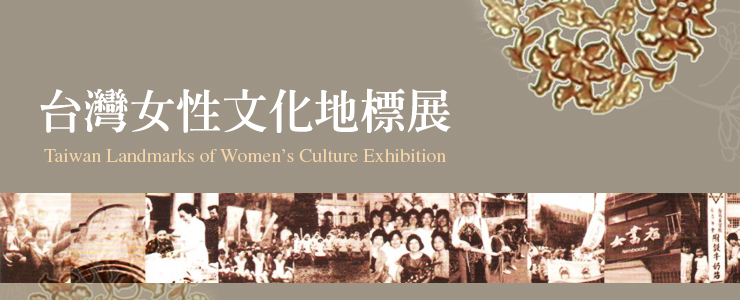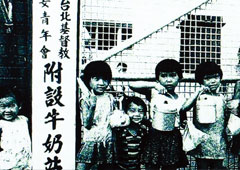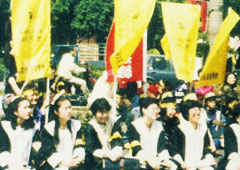
To represent the circumstances of Taiwanese women’s lives and activities of the past, Taiwan Women’s Center has cooperated with National Cultural Association. Based on Women Stories—Taiwan Women’s Landmarks published by National cultural Association in 2006, the exhibition aims to demonstrate pioneering and historical women activities over the past 400 years in Taiwan. The exhibition presents Taiwan women’s status and living space in public in different eras, which has the vital significance in historical aspects.
In retrospect, the development of women’s rights in Taiwan is a combined effort made possible by innumerous individuals and associations from different generations. The exhibition of Taiwan
The establishment of Taiwan Women’s Landmarks was inspired by a series of events, First, when we visited the small town of Seneca Falls in eastern United States. This was the birthplace of feminism in the United States, where prominent women rights reformer Elizabeth Cady Stanton rallied with more than a hundred women for women’s right to vote. We were deeply touched by the historical site. Furthermore, a bridge which crosses the River Seine was named after the famous French feminist Simone de Beauvoir during the International Women’s Day by Paris mayor in 2005. These events made us reflect on the many stories of women in Taiwan which provide valuable and pioneering experiences to younger generations committed to women rights and were the inspiration for the creation of Taiwan Women’s Landmarks by the National Cultural Association.
After one and half years of brainstorming, inspiration and joint participation of women artists, architects and designers, a new mapping for Taiwan’s Female Landmarks took form. In 2006, Tamsui Girls’ School was officially named as Taiwan’s first women’s landmark signifying a milestone for Taiwan and its women’s rights movements.
We believe Taiwan’s women landmarks is a lighthouse that provides directions to women instead of short-lived firework. Let women’s persistence be the legacy of women’s fight against biases and prejudices.
|
1. Tamsui Girls' School: the First Girl School in Taiwan |
|
 More... |
Established by Canadian Presbyterian missionary Dr. George Leslie Mackay and his wife Madam Chang Chong-ming in 1884, Tamsui Girls’ School was the first-ever girl school in Taiwan. The school changed the fat of Taiwan girls and ended the age old belief that women who do not possess talents are virtuous. Girls received free education and boarding, learned needlework, studied the Bible at school and were freed from foot-binding traditions. |
|
2. Chang Jung Girls’ Senior High School: The Enlightenment for Girls in Southern Taiwan |
|
 More... |
With the advocacy and efforts by the Presbyterian missionary Rev. Hugh Ritchie and his wife Mrs., Shin Lou Girls’ School opened in 1887 as the first girls’ school in southern Taiwan. The precondition for attending the school was for girls to give up foot-binding. This caused a far-reaching impact on the Taiwan society at the late Ching dynasty. Later on, Miss Joan Stuart and Miss Annie E. Butler were responsible for the school affairs, marking the significant beginning of girls’ education in southern Taiwan.. |
| 3. Madam Hus shih-sian- Madam Hus shih-sian | |
 More... |
As the daughter of a highly regarded scholar in Tainan, Madam Hsu Shih-sian was the first female to obtain a phD degree in Medicine in Taiwan. Madam Hsu and her husband set up “Sun Ten Tong Hospital” and were known as the “Doctor Couple.” As a woman forerunner, Madam Hus engaged herself in politics in 1964. She advocated women’s rights, set up women associations and promoted the abolishment of licensed prostitutes. She was praised by the public as Mazu (Goddess of the Sea) in Jiayi for her honesty., hard work and her dedication in providing medical care. |
| 4. YWCA- Taiwanese Women in the International Community | |
 More... |
Taiwan’s first international, religious, service-oriented women’s organization, Taipei Young Women's Christian Association (YWCA), was set up in 1949. At the time, local and foreign female missionaries set up milk and cookie stations in Taipei to provide food and other daily necessities to children in poverty every day. YWCA was also dedicated to reducing poverty, providing education to women, and teaching women skills that enabled them to make a living. |
|
5. National Women’s League of the Republic of China |
|
 More... |
The National Women’s League (NWL) of the Republic of China was set up in 1950 by Madam Chiang Song Mei-lng, the wife of former President Chiang Kai-shek, and the wives of numerous civil servants and entrepreneurs. NWL made clothes and provided daily necessities to soldiers in service, organized visits to encourage soldiers at the front line and provided services for soldiers’ families. After Taiwan retreated from United Nation, Madam Chiang set up 22 overseas NWL branches that provided medicine and financial aid to countries in need. |
| 6. Pioneer Publishing | |
 More... |
During the martial law period in Taiwan in 1971, Madam Annette Hsiu-lien Lu published an article entitled “Traditional Roles of Men and Women” against political pressure, which heralded the beginning of women movement. Madam Annette Lu later set up a protection hotline for women workers in Kaohsiung. |
| 7. Former Site of Awakening Foundation in Boai Road in Taipei | |
 More... |
Awakening Foundation was set up by feminists including Madam Lee Yu-jen, Madam Wu Jia-li, Madam Bo Cing-rong and Madam Yu Mei-nyu in 1982. The Foundation raised women rights awareness by publishing magazines to spread the thoughts. After martial law was lifted in Taiwan, Awakening Foundation rented this former site for its office in 1987 and eventually became neighbors with the Warm Life Association and the Women’s Rescue Foundation. These organizations cooperated with each other, shared limited resources, and together wrote a new chapter of “Herstory” in for the feminist movement in Taiwan. Awakening Foundation is viewed as the engine of women rights movement, leading broad discussion on variety of women issues. |
| 8. Homemaker’s Union and Foundation: a Stage for Homemakers and Environment Protection | |
 More... |
Homemaker’s Union and Foundation (HUF) was set up by a group of homemakers committed to environmental protection in 1989. HUF published handbooks to encourage environmental protection awareness and trained housewives to promote environmental protection in their communities and schools. HUF called for garbage classification and recycling ten years before the practice was adopted by the government as a national policy. |
|
9. Fembooks: the First Bookstore of Women Movement in Chinese Community |
|
 More... |
Opened in 1994, Fembooks was the first feminist bookstore for the women movement in the Chinese community. Fembooks represented important enlightenment for a new female generation. Fembooks regularly holds series of feminist courses, activities and press conferences for new books. Fembooks called itself a “woman’s own room”, which represents warm and free space for women readers and hopes to provide a porthole to nurture women’s self awareness. Fembooks stands as a vital multicultural indicator in Taiwan. |
|
10. Puyuma Women Festival |
|
 More... |
Pinuyumayan, the matriarchal aboriginal tribe in Taiwan, holds its annual women festival after weeding in March. The festive activities are arranged and performed by senior tribal women. Wearing traditional costumes and flower wreath, all female members in the tribe parade to the beat of music. After returning to Palakuan, chief and elders line up to welcome female members and show their respect to senior tribal women. Meanwhile, all male members prepare food and drinks to show their gratitude for women. The century-long traditional festival not only strengthens tribal spirits but passes along Pinuyumayan songs, ceremonies, embroidery, craft and culture to future generations. |

